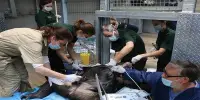According to a statement from the health minister on Friday, the victim’s father, who was a member of the group the victim had interaction with in a province east of the capital Phnom Penh, tested positive for the virus but showed no symptoms.
The statement omitted information about the other group members’ test findings and did not explain how the victim’s father acquired the virus, also known as bird flu.
According to Bunheng on Thursday, the girl’s case marked the first documented human infection with the H5N1 strain in the Southeast Asian nation since 2014.
According to the statement, the child from Prey Veng province was identified as having bird flu after developing a high fever and cough on February 16.

She was moved to the National Children’s Hospital in Phnom Penh when her situation worsened, but she passed away on Wednesday, according to the health ministry.
According to the World Organisation for Animal Health (WOAH), bird flu has devastated farms all over the globe since early last year, killing more than 200 million birds either directly from the illness or as a result of mass culls.
The H5N1 influenza has spread to mammals, according to the World Health Organization (WHO), but the danger to humans is still minimal.
According to WHO Director-General Tedros Adhanom Ghebreyesus, H5N1 has been spreading among domestic and wild birds for 25 years, but recent reports of infections in mink, otters, and sea lions “need to be watched carefully.”
Health officials in Cambodia advised people to avoid handling sick or deceased animals and birds and to call a hotline if they had any suspicions that they had become ill.
















